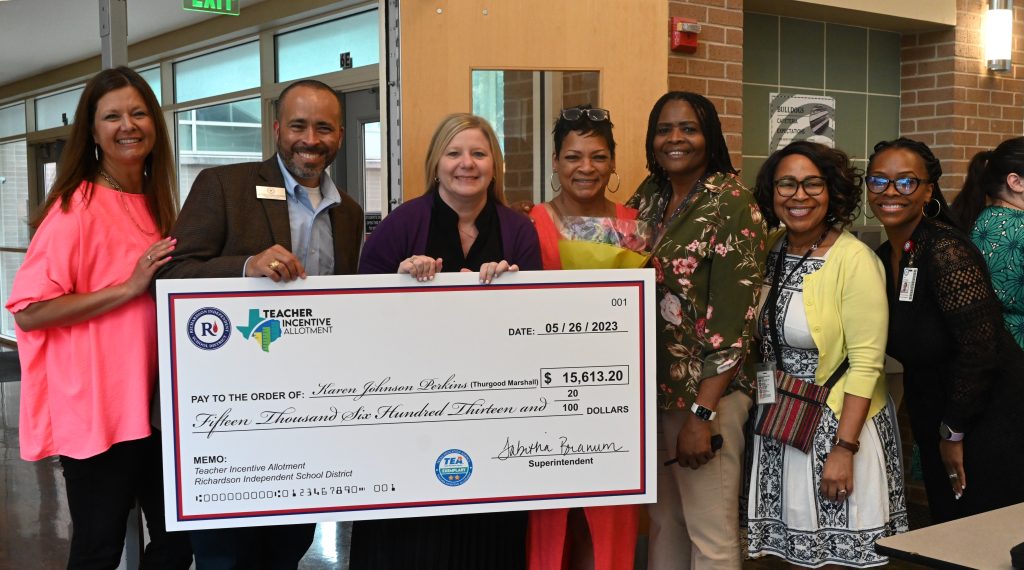Teacher Incentive Allotment
Overview:
In 2019, the 86th Texas Legislature created the Teacher Incentive Allotment (TIA) as part of House Bill 3 (HB 3) to provide additional funding for effective teachers. The focus of the TIA is to prioritize teaching in high needs areas and rural school districts and reward high performing teachers. RISD has applied to participate in TIA to support the district’s strategic plan to recruit, retain, and reward quality personnel.
RISD is one of more than 800 districts that has applied to participate in this state program to reward teacher excellence. The TIA program, at its core, aims to provide more funding and in turn increased salaries to highly effective teachers. RISD has developed a locally developed plan for the implementation of TIA, including descriptions of the essential components of the TIA system, how overall teacher ratings and designations levels are calculated, and a summary of the annual evaluation cycle.

TIA Campuses for 2025-26:
Full Implementation of our Local Designation System: Carolyn Bukhair, Forest Lane Academy, RISD Academy, Aikin, Audelia Creek, O.Henry, Jess Harben, Terrace, Skyview, Parkhill JH, Forest Meadow MS, Apollo JH
New to TIA for 2025-26:
FAQs:
- Teacher performance (using the T-TESS dimensions and rubric)
- Student Growth (student growth measures from assessments, SLO processes)
- Professional Development (credentialing processes)
- Campus Culture (survey results)
All teachers will be evaluated using all four components of the TIA system (teacher performance, student growth, professional development, and campus culture). In order to ensure a fair, accurate, and rigorous system, teachers are grouped based on their various assignments.
Additionally, National Board Certified Teachers (NBCTs) will earn a Recognized designation on their Texas educator certificate, if they have a one-year or standard Texas teaching certificate. The designation will expire in conjunction with the teacher’s National Board Certification.
The Texas Teacher Evaluation and Support System (T-TESS) will be used to measure the level of effective teaching. T-TESS strives to capture the holistic nature of teaching: the idea that a constant feedback loop exists between teachers and students, and gauging the effectiveness of teachers requires a consistent focus on how students respond to their teacher’s instructional practices. For those reasons, each of the observable domains in T-TESS focuses on teachers and students rather than separating them out into separate domains. Ultimately, T-TESS is a process that seeks to develop habits of continuous improvement, and the process itself best leads to that outcome when appraisers and teachers focus on evidence-based feedback and professional development decisions based on that feedback through ongoing dialogue and collaboration.
Student growth will be measured using multiple sources and calculated based on teacher category and student participation. Formative assessments may include MAP and CIRCLE with data collected at different stages of the year (BOY, MOY, EOY). Summative assessments may include STAAR and TELPAS. Student Learning Objectives (SLOs) may be used for subjects without formative or summative assessments to show growth toward specific TEKS using portfolios, pre- and post-testing, etc. An overall measure of student growth for the campus will also be used (Domain II rating) for all teachers to promote collaboration across the campus.
Over the past three decades, researchers and educators have increasingly recognized the importance of campus culture in the public school setting. Campus culture is associated with and/or promotes healthy relationships, school connectedness, engaged learning and teaching, school improvement efforts, safety and dropout prevention. A sustainable and positive campus culture fosters youth development and learning, and supports students, families and educators in working together to develop, live, and contribute to a shared school vision. Results from student surveys and parent surveys will be used to measure teacher impact on classroom and overall school culture.
RISD is participating in Cohort C as part of the TEA application process. This link is an overview of the program implementation timeline that the district will follow.